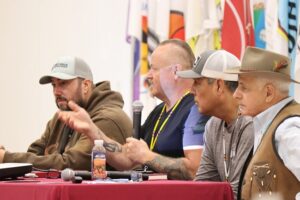Anishinabek Nation Mooz Maawanjiding – Moose Symposium panel provides insights on adapting to changes in the moose

By Laura Barrios
KETEGAUNSEEBEE (GARDEN RIVER FIRST NATION)— The Anishinabek Nation held its first Mooz Maawanjiding – Moose Symposium in Ketegaunseebee (Garden River First Nation) on September 4-5, 2024.
The goal of this gathering was to create connections amongst mooz (moose) advocates and reconnect participants to their relationship with the mooz to better understand their health concerns, and explore management practices and Western science research methods.
Day 1 of the gathering welcomed a panel of experienced hunters, Adam Christensen from Red Rock Indian Band; Anishinabek Nation Lake Huron Regional Chief Scott McLeod from Nipissing First Nation; John Paul Kohoko from Algonquins of Pikwàkanagàn First Nation; and Phil Goulais of Nipissing First Nation, who shared their insights on adapting to changes in the mooz.
When asked to recollect their first experience with hunting and harvesting, they all recounted memories dating back to a very young age. They all shared a common lesson that they learned early on in their journeys: respect the mooz and the land.
“You must constantly remind yourself of how important these animals are to you and your people, and you need to respect that. You need to take care of them,” expressed Regional Chief McLeod.
“If we only take what we need and are respectful, things will be better for the future if we keep protecting the land,” added Christensen.
The panel also discussed the spiritual and cultural aspects of mooz harvesting.
“When it comes to spirituality, one of the things we have to understand is that it doesn’t necessarily mean any deep ceremony or deep teachings or cultural teachings, it can be a lot more subtle,” shared Regional Chief McLeod. “It’s about taking a moment and setting semaa (tobacco) down to say miigwech (thank you) when they offer their life to us.”
“My uncle and I always laid tobacco down where the moose passes and when we take it out of the bush. And we say a prayer,” added Christensen.
“The world is different than how when we grew up,” expressed Kohoko. “To keep the traditions going is to teach [our kids] what we know, but adapt to the world that surrounds [them] now.”
Earlier in the day, Nipissing First Nation Knowledge Keeper Perry McLeod-Shabogesic, who helped set the tone on Anishinaabe perspectives on the history and importance of the moose, shared a teaching regarding Anishinabek practices surrounding hunting and harvesting, echoing the panel’s sentiment.
“It’s not just going out and shooting this animal. This animal, in its own way, will offer itself to you. They have their way of offering themselves, of giving you a moment of choice. When it pauses, that is when it’s offering itself to you…Moose is probably the most important animal—at least the strongest relationship—because it has kept us alive. It has fed our families. We owe so much to the moose.”
While exploring some of the biggest threats to the health and management of mooz, the panel agreed that the greatest threat to mooz is humans, whether it be from overharvesting, overdevelopment, or climate change.
“It’s not moose that we’re trying to manage, it’s human activity that we need to manage – if you don’t afford a tree its rights, then your rights are extinguished; if you don’t allow the animals to have rights to live, then your rights are extinguished; if you don’t allow the water the right to be clean, your rights are extinguished,” stated Regional Chief McLeod. “Animals require respect, and if you lose that, that’s when over-harvesting happens and they start to disappear.”
“How we deal with moose management is going to be a task that’s daunting, but it’s on us, on the ministries, on the governments. Without land, the moose have nowhere to go. As soon as that’s gone, because of all of the projects and development, we’re going to lose the space they need to live, and we’re going to lose that spirit,” shared Kohoko.
When asked if these threats have impacted the health of the mooz, the panel quickly identified the correlation between threats and impacts and left participants with something to think about.
“The reality is that there are subtle changes that are happening that we’re not aware of now, but we will be aware of sooner rather than later and that’s the environmental impacts of climate change. Moose are designed for the harsh winters and cold of these territories, but that’s changing. What are the impacts of that going to be? These changes are in motion and they’re coming, so how are we going to adapt?”
One panelist reminded participants of why mooz need human care and protection, and it starts with caring for the environment.
“In the last few years, I’ve been observing the moose in the marsh and other areas, and I noticed that what’s really important here is how they’re feeding and taking those medicines. They have to be protected because those moose are taking those medicines and we’re eating the moose. The healthiest meat you can eat is moose meat – there’s a lot of medicines and nutrients in them. The environment needs to be protected so those animals can remain healthy, and in turn, us too.”
Day 1 of the gathering also featured a Moose Call Competition; a presentation on Moose Health exploring methods, insights, challenges, and climate realities presented by wildlife pathologist with the Canadian Wildlife Health Cooperative Brian Stevens and Ministry of Natural Resources senior wildlife policy advisor Patrick Hubert; and presentations by multiple organizations on Mooz Research projects and initiatives that are currently underway.

